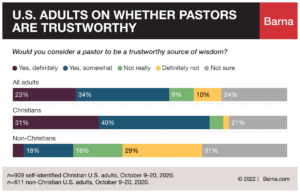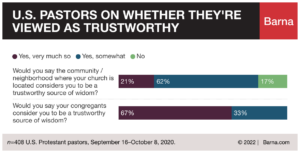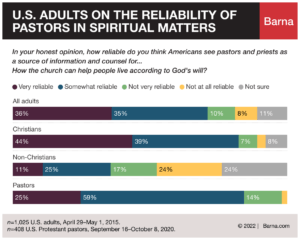New research confirms what many pastors already know — that they are decreasingly respected and influential in U.S. society.
“Pastors, for the most part, are peripheral and ornamental. Quaint, but not entirely necessary. Kind, but not wholly credible,” Barna senior fellow Glenn Packiam summarizes in The Resilient Pastor: Leading Your Church in a Rapidly Changing World.
The book builds on previous Barna research into Americans’ overall trust and confidence in pastors to understand the needs of their communities. Relatively few U.S. adults (21%) and non-practicing Christians (18%) say they “strongly agree” local clergy are trustworthy. Barely more than half of practicing Christians, at 52%, strongly agree.
 But a Feb. 16 Barna article summarizing The Resilient Pastor teases out the confidence levels that Americans, including pastors, have toward clergy as sources of wisdom and guidance.
But a Feb. 16 Barna article summarizing The Resilient Pastor teases out the confidence levels that Americans, including pastors, have toward clergy as sources of wisdom and guidance.
Only “57% of all U.S. adults agree at least somewhat that a pastor is a trustworthy source of wisdom. Christians, naturally, are far more likely to agree (31% definitely, 40% somewhat), while non-Christians tend to disagree (18% not really, 29% definitely not),” the Barna report said. “Still, many Americans — including one in five Christians — admit feeling unsure whether pastors are trustworthy (24% all adults, 21% Christians, 31% non-Christians).”
Barna also found that clergy are all too aware of those attitudes.
“Pastors themselves echo what the general population reports, including the sense of a gap in trust outside the church. While four in five pastors (82%) agree their local community ‘somewhat’ views them as a trustworthy source of wisdom, just one in five (21%) states this is very much the case. On the flip side, all pastors say their congregants consider them to be a trustworthy source of wisdom, 67% of whom strongly affirm this.”
But the ministers surveyed agreed they have less pull in the culture than in previous years.
 “Data show that today’s pastors themselves perceive limits to the influence of the pastorate in the public square. Though many feel they offer reliable counsel as to how people can live out their convictions privately and publicly (14% very, 56% somewhat), significantly fewer feel they can confidently speak into how Christians should inform America’s political and justice systems (3% very, 29% somewhat).”
“Data show that today’s pastors themselves perceive limits to the influence of the pastorate in the public square. Though many feel they offer reliable counsel as to how people can live out their convictions privately and publicly (14% very, 56% somewhat), significantly fewer feel they can confidently speak into how Christians should inform America’s political and justice systems (3% very, 29% somewhat).”
But clergy remain held in higher esteem on matters of faith, the Barna report said.
When asked to rate the competence of pastors specifically on spiritual issues, 71% of U.S. adults said clergy are “very” or “somewhat” reliable, compared to 83% of Christians who hold that view.
The report added that only 25% of pastors considered clergy to be “very reliable” in this regard, compared to 59% who answered “somewhat reliable.”
When researchers asked respondents to describe the reliability of clergy in relational matters, 65% of all adults said pastors are “very” or “somewhat” reliable. By comparison, 75% of Christians hold that view, as do 69% of clergy.
However, non-clergy respondents who marked “very reliable” in the relational category far outnumbered clergy. Barna said 26% of all adults, 32% of Christians and only 11% pastors held the most positive view.
 Pastors must stop blaming the culture and start owning their part in their slide in respect and trust in U.S. society, Packiam wrote. “The path to regaining credibility begins with taking responsibility. We must face the reality that we have contributed to the crisis of credibility.
Pastors must stop blaming the culture and start owning their part in their slide in respect and trust in U.S. society, Packiam wrote. “The path to regaining credibility begins with taking responsibility. We must face the reality that we have contributed to the crisis of credibility.
“Yes, there are cultural headwinds that have changed the social standing or cultural power of a pastor. But we have made a mess of things too. From small country churches to uber-megachurches, many pastors have been found to be bullies and hypocrites, alcohol abusers and womanizers. The crisis of credibility is a symptom. The misuse of authority is the root cause.”
Cultivating trust within congregations and communities is necessary to repair the damage, he adds. “If the mishandling of power has led to the loss of credibility, returning to the source and shape of a pastor’s authority is the way back home. I don’t mean that we can find a way to return to a central place in our communities. But we can once again become trustworthy people when we rediscover the source and the shape of pastoral authority.”
Related articles:
Amid the pandemic and racial reckoning, most Americans give clergy high marks


